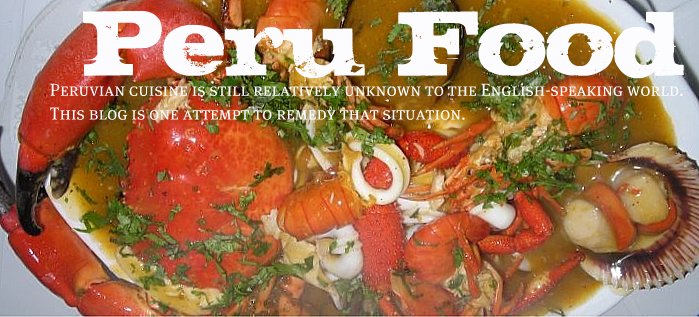Link to original Spanish article in Etiqueta Negra here.
This article by Peruvian journalist Daniel Titinger appeared in the excellent Peruvian magazine, Etiqueta Negra. This is not an official translation; rather, my own translation which I did in order to bring you this information about ceviche. Daniel Titinger has kindly agreed to permit me to post it on this blog.
If you have a chance to get a copy of this magazine, do so. Calling themselves 'A Magazine for the Distracted,' Etiqueta Negra (Black Label) has excellent articles and first-rate photographs. Etiqueta Negra is fast-becoming a leading magazine in the Spanish-speaking world.
Whenever I go to Peru I stock up on the current and previous month's editions and bring them back home. I hope you do the same on your next trip to Peru.
The Ceviche Route
By Daniel Titinger
Son of a bitch!
Ceviche (also spelled cebiche in Spanish) may owe its name to a real son of a bitch.
It was the beginning of the 19th century. In Lima, diners were bored eating meaty soups; in France, the gourmet and lawyer Jean Anthelme Brillat-Savarin was writing about the dangers of acidic food; and off the north coast of Peru, an English ship was anchoring.
According to the gastronomical cognoscenti, off the ship disembarked an English sailor. As he reached the beach, he saw a dark-skinned man with prominent cheek-bones eating raw fish with salt and lots of ajà (as hot peppers are called in this part of the world).
The sailor asked to try a bit. He took a piece of the raw fish seasoned with ajà just like the local man's, bit into it, began to chew, and when he felt his mouth, throat, and even the blood in his body suddenly turn to fire, taking him to hell and back to heaven in a moment's breath, he hoarsely cried out in desperation, "Son of a bitch!"
In the wise way of language, that phrase became sonabitch, and then, simply, sebitch. And that is how, as the story goes, in a happy outburst, ceviche was christened.
Spicy, salty, provocative. Like any complex dish, ceviche is circular---one doesn't know where it begins or where it ends.
The origin of the word ceviche might be a different one. "But that's not important," complains Cucho. We are about six kilometers off the coast of Punta Sal in northern Peru, in a white boat, with a blue sea, a radiant sun, an at the exact coordinates where nothing matters much.
I have traveled over a thousand kilometers of the Panamericana Norte highway, following the route of the finest ceviches, and now, on the third day of this trip, with Ecuador just up the road, a fisherman tells me he has no interest whatsoever in stories about the origin of the name of this quintessential Peruvian dish.
He may be right. In his small town of Máncora, he is simply known as the finest fisherman in the North, but sometimes, when the sea becomes rough, not a single fish takes even his bait. He wakens daily at four in the morning, and the origin of the word ceviche is not among his concerns.
What he does care about, for example, is that people call him Cucho, although his real name is William Anto. What the fisherman doesn't know is that the word cucho also means 'fertilizer,' according to my dictionary, proving that sometimes words do matter.
In prehistory, what we call ceviche likely included ají, salt, and even tumbo, an acidic Andean fruit similar to maracuyá, but ceviche, the dish as we know it, only began to exist when the word was first uttered.
Then again, there are different stories. Others suggest the same English sailor may not have sampled anything at all. As he saw the local man put the fish in his mouth, he may have simply pointed and yelled out, "See the beach! See the beach!"
Historian María Rostworowski, author of A History of the Tahuantinsuyo, has another hypothesis: in 1535, four Moorish slave women were sent from Spain to Peru to serve the Spanish conqueror Francisco Pizarro. Possibly, when they saw people eating raw fish with salt and ají, they were repulsed by what they considered savage behavior, yet they may have thought the dish might taste better marinated in the juice of that green, round fruit they had brought from far away: limes. Or, oranges.
Seibech is an Arabic word for acidic foods. Since Peruvians did not speak Arabic, they only heard something that sounded like ceviche.
Peru.Food@gmail.com
.
.
.
Click here for the Peru Food main page.
TAGS: Peru, Peruvian, food, cooking, cuisine, cocina, comida, gastronomía, peruana
TAGS: Peru, Peruvian, food, cooking, cuisine, cocina, comida, gastronomía, peruana

1 comment:
Otra hipótesis bastante difundida es de que cebiche nació como diminutivo despectivo de cebo. Esta especulación se basa en que los marineros árabes, y después los europeos, acostumbraban estar preparados para comer el cebo de la pesca, y utilizaban limón para “cocinarlo” en frío a bordo de sus embarcaciones.
http://www.planetacurioso.com/2007/07/20/cual-es-el-origen-de-la-palabra-ceviche/#more-2480
Post a Comment